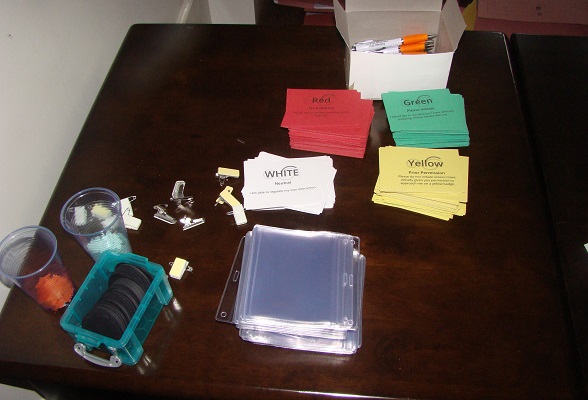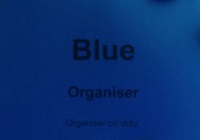?Image above: Interaction badges used at the Autscape conference. (Photo by Caroline Hearst)
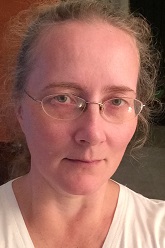 My name is Heta Pukki, and I work for the Autism&Uni project in Finland. I have an M.Sc. in biology from the University of Helsinki and an M.Ed. in special education from the University of Birmingham. I received an ASD diagnosis at age 32. Over the past 17 years I have worked in numerous roles, both volunteer and professional, with autistic adults and children.
My name is Heta Pukki, and I work for the Autism&Uni project in Finland. I have an M.Sc. in biology from the University of Helsinki and an M.Ed. in special education from the University of Birmingham. I received an ASD diagnosis at age 32. Over the past 17 years I have worked in numerous roles, both volunteer and professional, with autistic adults and children.
Recently I had a chance to present a workshop on our project at the Autscape conference, a unique event that took place at an idyllic venue near Ditchingham, Norfolk. Autscape is organized and run mainly by autistic adults, having taken shape over the past ten years as a residential conference dedicated to creating “autistic space” – a situation where autistic people’s preferences and characteristics are considered and catered for in every possible way.
Besides providing an ideal forum for a presentation on the ethics of research involving autistic adults, this offered me the personally satisfying experience of seeing how the event had evolved. I had the good fortune of participating in an Internet discussion group around 2004, in discussions that lead to the establishment of the first Autscape. Since then, the conference has grown in size and become more sophisticated in the range of accommodations it offers, while continuing to inspire impressive dedication among its volunteer organisers.
The Autism&Uni project shares certain important core principles with Autscape. One is commitment to seeking solutions that are based on the real-life experiences and expressed preferences of autistic adults, rather than adopting any external viewpoint or theory as the basis for provision. Another is determination to involve autistic adults as active agents in research, not merely as subjects who are given a set of questions to answer, only to be forgotten in later stages of the study.
At Autscape, as with other audiences that have heard about the Autism&Uni project, I saw great enthusiasm and eagerness to contribute personal experiences and views. The message we generally get from diverse groups – university staff, doctors, disability workers and students – is that it’s about time somebody did this. What is characteristic of the Autscape crowd is that they do not let us off easy. Decisions have been made before any autistic adults became involved, and they want to know why. How come they can no longer influence the choice of methodology or theoretical framework? Why is the focus on young students, when there are probably many mature autistic students needing support, as well? The funding has been sought and granted for this approach and no other. Their questions challenge researchers and project planning teams to go even further in the future, involving autistic adults in absolutely every stage of the process.
What struck me, watching the event unfolding as a whole, was how the practical goals of an Autscape organiser and a worker in the Autism&Uni project are incredibly similar. We want to improve the experience that the conference participant or the young student has while attending lectures, participating in discussions, learning and interacting with groups of people. We face the challenge of finding accommodations for navigating unfamiliar surroundings, communicating with strangers, facing sudden changes in schedule, and trying to adjust to difficult sensory environments. Still, there are underlying differences, as Martijn Dekker, Chair of the Autscape Organisation board, points out:
There is an important difference, though: Autism&Uni aims to design accommodations for autistic students to function in a setting designed for the neurologically typical, whereas Autscape designs the whole setting for autistic people in the first place.
The basic volunteer organiser does a fair bit of running. While many ingenious structures and solutions are in place to prevent problems, it is never possible to foresee every situation. Some first-timers are only learning to utilize the accommodations, some tend to forget them in a stressful situation.
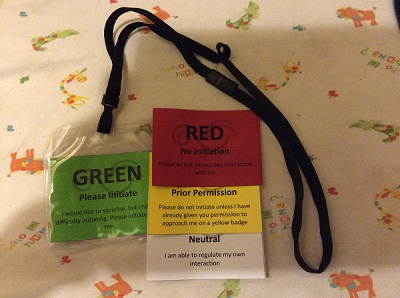
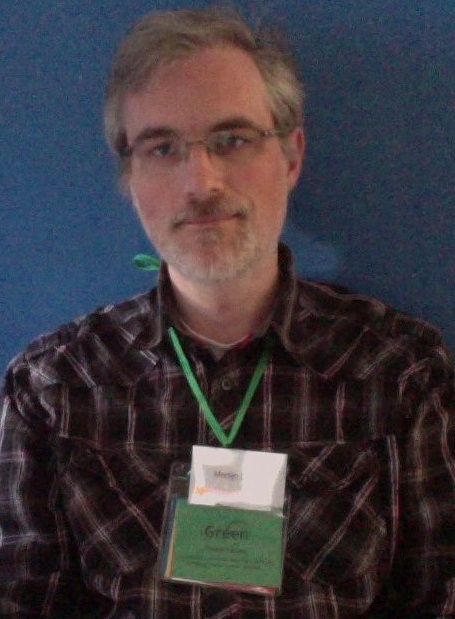
There are complaints about people forgetting that wearing a red badge signals “do not initiate conversations with me”, or someone not being able to sleep because others are forgetting rules about showering at night. A speaker is late, and for a moment there is general uncertainty about how the program will change, and how changes will be communicated to everyone.
Such incidents illustrated many of the issues brought up by workshop participants: I was told that solutions cannot be limited to the time actually spent at lectures, courses and seminars. The crucial thing that prevents effective participation may just as well happen outside those hours. An effective tool might be mainly focused on study skills, but it should refer in some way to common challenges in other areas of the student’s life. People not getting to sleep at Autscape provided the perfect practical example. Noisy student accommodation is probably not that uncommon. If you don’t sleep, what use are your study skills? You need skills or accommodations to ensure peace and quiet at night instead – or in addition to – other kinds of support.
In the end, what seems to work for most Autscape participants most of the time – they do keep coming back! – is a package of detailed printed instructions, maps and schedules combined with occasional personal attention. And that is how many people see the Autism&Uni project: it is possible to have a useful package, as envisioned in the project plan, a package of scenarios based on autistic students’ experiences, which can anticipate some frequently occurring problems and help in solving them. It is not realistic to expect that it could go very far alone.
One message that came out clearly in the workshop was this: Pointers on how and when to seek out personal attention need to be incorporated into the scenarios. We need structures that allow our software tool to support real-life interaction with people. We need something analogous to the Autscape 2014 information package informing us that “… two organisers will be on duty at all times. A duty rota will be displayed in the information area (see Map) and the organisers on duty will wear blue hats, armbands or sashes so that you can identify them”.
Life is so much simpler when you know that you can always ask the person with the blue sign! In universities across five countries, no single set of instructions like that will be possible. Still, considering this and other similar accommodations will hopefully give us ideas about the basic principles behind experience-based solutions that really work.
For general information on the Autscape conference, go to
the Autscape website
For a concise summary on the Autscape approach to autistic needs and accommodations, see Autistic Needs

